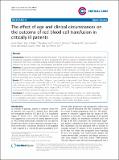The effect of age and clinical circumstances on the outcome of red blood cell transfusion in the critically ill patients
Author(s)
Dejam, Andre; Feng, Mengling; Cismondi, Federico; Park, Shinhyuk; Samani, Saira; Samani, Zahra A; Pinto, Duane S; Samani, Zahra; Malley, Brian E.; Celi, Leo Anthony G.; ... Show more Show less
Downloads13054-014-0487-z.pdf (326.2Kb)
PUBLISHER_CC
Publisher with Creative Commons License
Creative Commons Attribution
Terms of use
Metadata
Show full item recordAbstract
Introduction:
Whether red blood cell (RBC) transfusion is beneficial remains controversial. In both retrospective and prospective evaluations, transfusion has been associated with adverse, neutral, or protective effects. These varying results likely stem from a complex interplay between transfusion, patient characteristics, and clinical context. The objective was to test whether age, comorbidities, and clinical context modulate the effect of transfusion on survival.
Methods:
By using the multiparameter intelligent monitoring in intensive care II database (v. 2.6), a retrospective analysis of 9,809 critically ill patients, we evaluated the effect of RBC transfusion on 30-day and 1-year mortality. Propensity score modeling and logistic regression adjusted for known confounding and assessed the independent effect of transfusion on 30-day and 1-year mortality. Sensitivity analysis was performed by using 3,164 transfused and non-transfused pairs, matched according the previously validated propensity model for RBC transfusion.
Results:
RBC transfusion did not affect 30-day or 1-year mortality in the overall cohort. Patients younger than 55 years had increased odds of mortality (OR, 1.71; P < 0.01) with transfusion. Patients older than 75 years had lower odds of 30-day and 1-year mortality (OR, 0.70; P < 0.01) with transfusion. Transfusion was associated with worse outcome among patients undergoing cardiac surgery (OR, 2.1; P < 0.01). The propensity-matched population corroborated findings identified by regression adjustment.
Conclusion:
A complex relation exists between RBC transfusion and clinical outcome. Our results show that transfusion is associated with improved outcomes in some cohorts and worse outcome in others, depending on comorbidities and patient characteristics. As such, future investigations and clinical decisions evaluating the value of transfusion should account for variations in baseline characteristics and clinical context.
Date issued
2014-08Department
Massachusetts Institute of Technology. Institute for Medical Engineering & Science; Harvard University--MIT Division of Health Sciences and TechnologyJournal
Critical Care
Publisher
BioMed Central Ltd
Citation
Dejam, Andre, Brian E Malley, Mengling Feng, Federico Cismondi, Shinhyuk Park, Saira Samani, Zahra Samani, Duane S Pinto, and Leo A Celi. “The Effect of Age and Clinical Circumstances on the Outcome of Red Blood Cell Transfusion in the Critically Ill Patients.” Crit Care 18, no. 4 (2014): 487.
Version: Final published version
ISSN
1364-8535
1875-7081